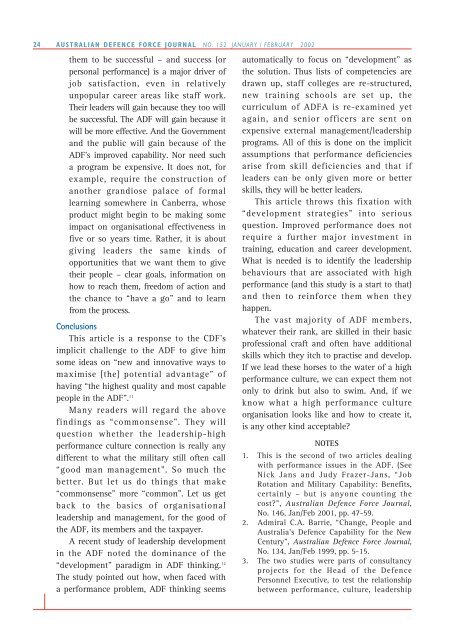ISSUE 152 : Jan/Feb - 2002 - Australian Defence Force Journal
ISSUE 152 : Jan/Feb - 2002 - Australian Defence Force Journal
ISSUE 152 : Jan/Feb - 2002 - Australian Defence Force Journal
- No tags were found...
You also want an ePaper? Increase the reach of your titles
YUMPU automatically turns print PDFs into web optimized ePapers that Google loves.
24AUSTRALIAN DEFENCE FORCE JOURNAL NO. <strong>152</strong> JANUARY / FEBRUARY <strong>2002</strong>them to be successful – and success (orpersonal performance) is a major driver ofjob satisfaction, even in relativelyunpopular career areas like staff work.Their leaders will gain because they too willbe successful. The ADF will gain because itwill be more effective. And the Governmentand the public will gain because of theADF’s improved capability. Nor need sucha program be expensive. It does not, forexample, require the construction ofanother grandiose palace of formallearning somewhere in Canberra, whoseproduct might begin to be making someimpact on organisational effectiveness infive or so years time. Rather, it is aboutgiving leaders the same kinds ofopportunities that we want them to givetheir people – clear goals, information onhow to reach them, freedom of action andthe chance to “have a go” and to learnfrom the process.ConclusionsThis article is a response to the CDF’simplicit challenge to the ADF to give himsome ideas on “new and innovative ways tomaximise [the] potential advantage” ofhaving “the highest quality and most capablepeople in the ADF”. 11Many readers will regard the abovefindings as “commonsense”. They willquestion whether the leadership-highperformance culture connection is really anydifferent to what the military still often call“good man management”. So much thebetter. But let us do things that make“commonsense” more “common”. Let us getback to the basics of organisationalleadership and management, for the good ofthe ADF, its members and the taxpayer.A recent study of leadership developmentin the ADF noted the dominance of the“development” paradigm in ADF thinking. 12The study pointed out how, when faced witha performance problem, ADF thinking seemsautomatically to focus on “development” asthe solution. Thus lists of competencies aredrawn up, staff colleges are re-structured,new training schools are set up, thecurriculum of ADFA is re-examined yetagain, and senior officers are sent onexpensive external management/leadershipprograms. All of this is done on the implicitassumptions that performance deficienciesarise from skill deficiencies and that ifleaders can be only given more or betterskills, they will be better leaders.This article throws this fixation with“development strategies” into seriousquestion. Improved performance does notrequire a further major investment intraining, education and career development.What is needed is to identify the leadershipbehaviours that are associated with highperformance (and this study is a start to that)and then to reinforce them when theyhappen.The vast majority of ADF members,whatever their rank, are skilled in their basicprofessional craft and often have additionalskills which they itch to practise and develop.If we lead these horses to the water of a highperformance culture, we can expect them notonly to drink but also to swim. And, if weknow what a high performance cultureorganisation looks like and how to create it,is any other kind acceptable?NOTES1. This is the second of two articles dealingwith performance issues in the ADF. (SeeNick <strong>Jan</strong>s and Judy Frazer-<strong>Jan</strong>s, “JobRotation and Military Capability: Benefits,certainly – but is anyone counting thecost?”, <strong>Australian</strong> <strong>Defence</strong> <strong>Force</strong> <strong>Journal</strong>,No. 146, <strong>Jan</strong>/<strong>Feb</strong> 2001, pp. 47-59.2. Admiral C.A. Barrie, “Change, People andAustralia’s <strong>Defence</strong> Capability for the NewCentury”, <strong>Australian</strong> <strong>Defence</strong> <strong>Force</strong> <strong>Journal</strong>,No. 134, <strong>Jan</strong>/<strong>Feb</strong> 1999, pp. 5-15.3. The two studies were parts of consultancyprojects for the Head of the <strong>Defence</strong>Personnel Executive, to test the relationshipbetween performance, culture, leadership
















